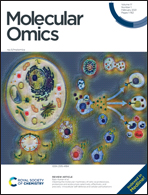Proteomics in idiopathic pulmonary fibrosis: the quest for biomarkers
Abstract
Idiopathic pulmonary fibrosis (IPF) is a debilitating chronic progressive and fibrosing lung disease that culminates in the destruction of alveolar integrity and dismal prognosis. Its etiology is unknown and pathophysiology remains unclear. While great advances have been made in elucidating the pathogenesis mechanism, considerable gaps related to information on pathogenetic pathways and key protein targets involved in the clinical course of the disease exist. These issues need to be addressed for better clinical management of this highly challenging disease. Omics approach has revolutionized the entire area of disease understanding and holds promise in its translation to clinical biomarker discovery. This review outlines the contribution of proteomics towards identification of important biomarkers in IPF in terms of their clinical utility, i.e. prognosis, differential diagnosis, disease progression and treatment monitoring. The major dysregulated pathways associated with IPF are also discussed. Based on numerous proteomics studies on human and animal models, it is proposed that IPF pathogenesis involves complex interactions of several pathways such as oxidative stress, endoplasmic reticulum stress, unfolded protein response, coagulation system, inflammation, abnormal wounding, fibroblast proliferation, fibrogenesis and deposition of extracellular matrix. These pathways and their key path-changing mediators need further validation in large well-planned multi-centric trials at various geographical locations for successful development of clinical biomarkers of this confounding disease.



 Please wait while we load your content...
Please wait while we load your content...